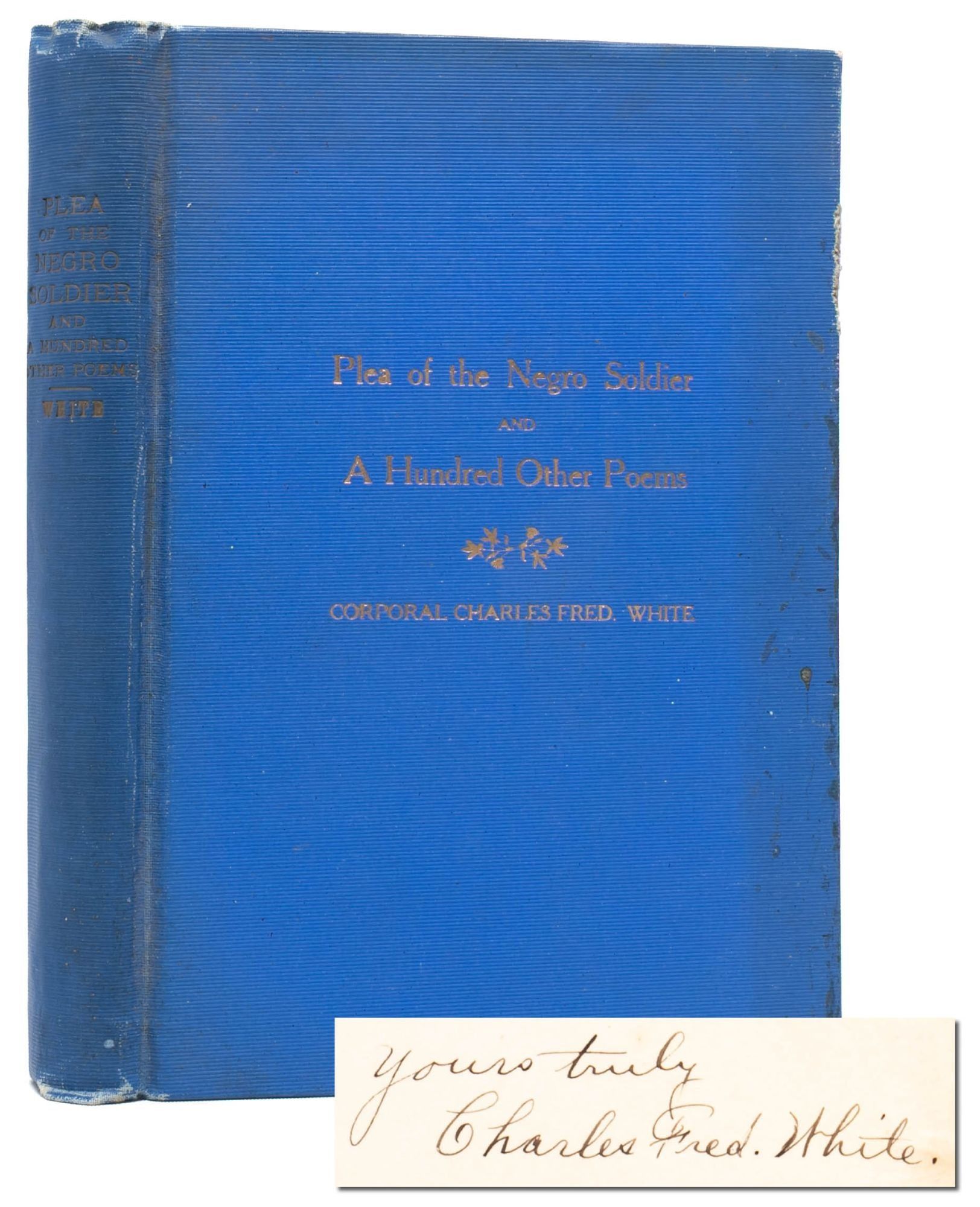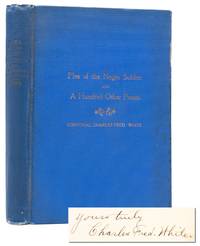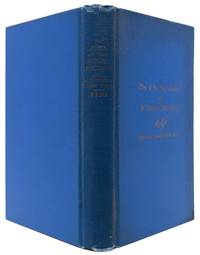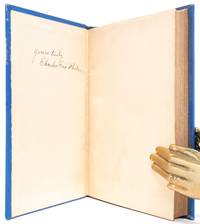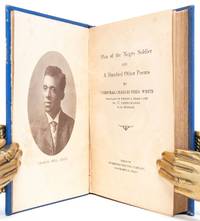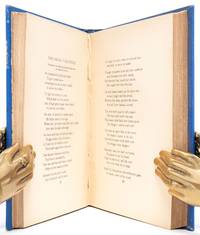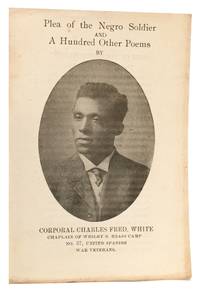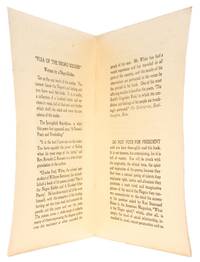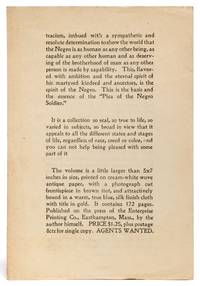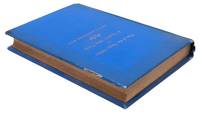Plea of the Negro Soldier (Inscribed first edition)
- SIGNED
- Easthampton, Mass: Press of Enterprise Printing Company, 1908
Easthampton, Mass: Press of Enterprise Printing Company, 1908. First edition. Very Good +. Inscribed by the author on the upper pastedown: "Yours truly - Charles Fred. White." Publisher's straight-grained blue cloth. Octavo. 171, [1] pp. With a photographic frontisportrait of the author. A bit of soiling and rubbing to upper board at fore-edge. Some foxing to frontispiece and first few leaves, otherwise clean throughout. A Very Good+ copy of a scarce and striking collection of poetry almost entirely produced by the author, who set the type, corrected the proofs, cut the paper, and ran the press, with the otherwise unrecorded [4] pp. publisher's prospectus laid in. The prospectus prints several testimonials for the work, one of which reads, "DO NOT VOTE FOR PRESIDENT until you have thoroughly read this book." This is the only copy of the book currently on the market.
Charles Frederick White (1876 - 1955) was born in Tennessee to two formerly enslaved parents. In 1899, he volunteered with the 8th Illinois National Guard, the only unit in the Spanish-American War led by Black officers. He rose to the rank of Corporal and served as the 8th's Chaplain. After the war, he studied at Williston Seminary in Massachusetts and later graduated from Penn Law School. White's only other published book was a 1912 guide to prominent local Black figures, businesses, and organizations, titled Who's Who in Philadelphia, which also included several more of his poems.
Plea of the Negro Soldier is a clear and impassioned statement against racism and in favor of dignity. Poems like "Afro-America," the five-part series "Meditations of a Negro's Mind," "The Negro Volunteer," and the titular "Plea of the Negro Soldier" reflect on White's personal experiences of racism, particularly his experience as a Black soldier who served a country in which he faced injustice and oppression. In his preface, White writes, "If you had served your country in the ranks of the volunteer army in foreign war, when that country did not protect your life, nor even your property, at home, when you could not be sure that upon your return you would not find that some friend or relative had been despoiled of life, liberty or property without due process of law;…if you had plodded wearily through the sultry, dusty streets of the business section of St. Louis, Missouri, on a hot summer day, parching with thirst, while not a druggist, confectioner, nor anyone else whom you asked would either give or sell you a drink of water or soda…or if you had been 'jim-crowed' in Little Rock, Arkansas; if you had been threatened with lynching by a mob of Missouri whites because you fought for your own rights; if even in many places in the North you had been proscribed, ostracised and mistreated, refused lodging, or recognition which you undoubtedly deserved;—and all this for no other reason than that your complexion is darker than the hue of those who so misuse you,—you would surely think this a wretched and ungrateful country. So, while reading the poems on the following pages, if you think that sometimes they are too radical or harsh, turn back to this foreword, read it again, and, taking for granted that the author's own experience is here but briefly told and that these writings are based upon actual facts, consider whether they are harsher than that experience."
Notably, this collection was written and published not long after the Brownsville affair in August of 1906, in which an entire regiment of Buffalo Soldiers were dishonorably discharged under the orders of President Theodore Roosevelt. All 167 members of the 25th Infantry Regiment were discharged after white residents of Fort Brown, Texas falsely accused the soldiers of involvement in the killing of a white bartender and the wounding of a white police officer. The incident sparked national outrage and is mentioned by White in the titular poem in the collection as one of the many injustices faced by Black soldiers: "My thirty years of living death / In bloody war avail me naught / When prejudice and perjured breath / Of Brownsville 'gainst my name is brought" (p. 142).
Blockson 6129. Very Good +.
Charles Frederick White (1876 - 1955) was born in Tennessee to two formerly enslaved parents. In 1899, he volunteered with the 8th Illinois National Guard, the only unit in the Spanish-American War led by Black officers. He rose to the rank of Corporal and served as the 8th's Chaplain. After the war, he studied at Williston Seminary in Massachusetts and later graduated from Penn Law School. White's only other published book was a 1912 guide to prominent local Black figures, businesses, and organizations, titled Who's Who in Philadelphia, which also included several more of his poems.
Plea of the Negro Soldier is a clear and impassioned statement against racism and in favor of dignity. Poems like "Afro-America," the five-part series "Meditations of a Negro's Mind," "The Negro Volunteer," and the titular "Plea of the Negro Soldier" reflect on White's personal experiences of racism, particularly his experience as a Black soldier who served a country in which he faced injustice and oppression. In his preface, White writes, "If you had served your country in the ranks of the volunteer army in foreign war, when that country did not protect your life, nor even your property, at home, when you could not be sure that upon your return you would not find that some friend or relative had been despoiled of life, liberty or property without due process of law;…if you had plodded wearily through the sultry, dusty streets of the business section of St. Louis, Missouri, on a hot summer day, parching with thirst, while not a druggist, confectioner, nor anyone else whom you asked would either give or sell you a drink of water or soda…or if you had been 'jim-crowed' in Little Rock, Arkansas; if you had been threatened with lynching by a mob of Missouri whites because you fought for your own rights; if even in many places in the North you had been proscribed, ostracised and mistreated, refused lodging, or recognition which you undoubtedly deserved;—and all this for no other reason than that your complexion is darker than the hue of those who so misuse you,—you would surely think this a wretched and ungrateful country. So, while reading the poems on the following pages, if you think that sometimes they are too radical or harsh, turn back to this foreword, read it again, and, taking for granted that the author's own experience is here but briefly told and that these writings are based upon actual facts, consider whether they are harsher than that experience."
Notably, this collection was written and published not long after the Brownsville affair in August of 1906, in which an entire regiment of Buffalo Soldiers were dishonorably discharged under the orders of President Theodore Roosevelt. All 167 members of the 25th Infantry Regiment were discharged after white residents of Fort Brown, Texas falsely accused the soldiers of involvement in the killing of a white bartender and the wounding of a white police officer. The incident sparked national outrage and is mentioned by White in the titular poem in the collection as one of the many injustices faced by Black soldiers: "My thirty years of living death / In bloody war avail me naught / When prejudice and perjured breath / Of Brownsville 'gainst my name is brought" (p. 142).
Blockson 6129. Very Good +.


